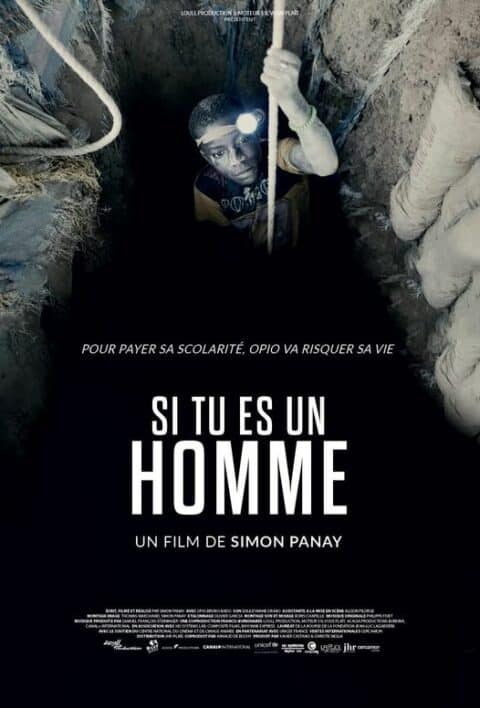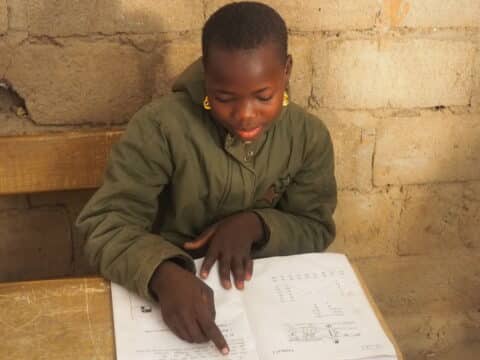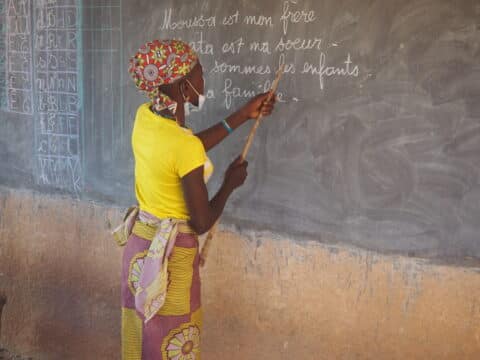Photo credits: Dramane Sessouma
The documentary film "If you are a man" by Simon Panay was released on 1 March. The film depicts the difficult situation of many children in Burkina Faso, who are forced to work in extreme conditions to support themselves and their families. It is an opportunity for Action Education to come back to the poverty of households, a major obstacle to children's education, and to the SCOLFILLE project, which allows many girls who have dropped out of school to be upgraded and reintegrated into the mainstream education system..
The challenges of access to school in Burkina Faso: The situation in Opio
The documentary film "If you are a man by Simon Panay, released in cinemas on 1 March, highlights a reality in many countries: the obligation for some children to work, sometimes in extreme conditions, in order to pay, among other things, school fees.

The film tells the story of 13-year-old Opio, who lives near the Perkoa gold mine in Burkina Faso. He works on the surface, earning only a bag of rocks a month. His father wants him to go to vocational school, but he cannot afford the school fees. So Opio has to raise the money and asks his boss for a promotion: permission to go down into the underground galleries where it is said that men can become rich.
The problem of schooling for children in Africa
While primary schools is mostly free in most West African countries, it is still an important investment for families There is a cost to buying books, uniforms and school supplies. It is also a loss of income for families because when a child goes to school, he or she does not contribute to the household income and does not work in the fields, for example. Many families can no longer afford it, especially in view of the rising cost of food and energy. The lack of means of parents is therefore one of the main reasons why households decide to send their children to school.
Without education, there is no chance of a better future!
Millions of children are currently out of school, mainly because of poverty, early marriages or gender-based discrimination against girls. However, without school, they themselves have almost no chance of escaping poverty. Once out of school, they are often used as family helpers for domestic work or forced to work. They in turn enter the vicious circle of poverty, with no way out.

Insecurity in Burkina Faso
In Burkina Faso, in the face of an unprecedented humanitarian and security crisis, access to education has become almost impossible. The deteriorating security situation has led to the internal displacement of nearly 2 million people, of whom more than 80% are women and children. Almost 40% of the population is affected by the closure of basic social services and the absence of state services. By the end of 2022, over 6,200 schools were closed due to insecurity. In this context, education becomes a luxury.
Projects carried out by Action Education in Burkina Faso
Helping vulnerable girls get back to school
 In Burkina Faso, many girls who do not attend school or who are not in school are forced to perform domestic tasks or work. Socio-cultural barriers also hinder their access to education.
In Burkina Faso, many girls who do not attend school or who are not in school are forced to perform domestic tasks or work. Socio-cultural barriers also hinder their access to education.
The "Schooling of Girls" (SCOLFILLE) project which Action Education has been implementing since 2021, enables young girls in the Central West region of the country, some of whom have been forced to move because of insecurity, to catch up and then join the mainstream school system to continue their studies. Through this project, Action Education, in partnership with the L'OCCITANE Foundation, enables 1872 girls aged between 9 and 13 to return to school.
Bridging classes for reintegration into the school system
The SCOLFILLE project focuses on two provinces - Ziro and Sissili - particularly in 6 communes in the Centre West region of the country. It is based on the establishment of bridging classes organised within of public elementary schools. After a year of accelerated learning, the girls return to the mainstream education system to continue their studies. The project provides facilitators, school furniture, teaching and learning materials, and school supplies for the students. The girls' school fees are covered and support is provided for the students' meals.
In parallel, the awareness-raising activities are conducted with parents and community leaders. Gradually, with the increasing involvement of communities, the socio-cultural perception of girls' education is improving.
For more information
- Burkina Faso: Helping vulnerable girls get back to school
- SCOLFILLE: a second chance for out-of-school girls and dropouts






